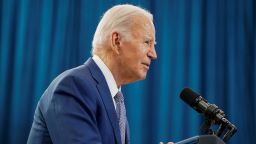Editor’s Note: David Axelrod, a CNN senior political commentator and host of “The Axe Files,” was a senior adviser to former President Barack Obama and chief strategist for the 2008 and 2012 Obama presidential campaigns. The opinions expressed in this commentary are his own. View?more opinion?on CNN.
Here’s the dirty little secret that Tuesday’s Michigan primaries laid bare: President Joe Biden and former President Donald Trump are bitter rivals, who desperately need each other.
Biden and Trump each?won?their primaries handily in the Wolverine State en-route to their expected rematch.?Yet, the story of the night was the votes they didn’t get —suggesting the degree to which each will be relying on fear of the other to bring recalcitrant voters around in the fall.
Biden won more than 80% of the vote Tuesday and?115 of Michigan’s 117 delegates. But a little over 100,000 Michiganders?— 13% of those who voted in the Democratic primary — cast their ballots for “uncommitted,” rather than Biden?to express?their opposition to the president’s handling of Israel’s ongoing war against Hamas and to demand a ceasefire in Gaza.
The movement took particular root in the Detroit suburbs, with its?sizable Arab-American population. More than half the voters?in?the towns?of Dearborn and Hamtramck sent an emphatic message of protest by choosing “uncommitted” over the incumbent president they?supported?overwhelmingly four years ago.
Biden’s vulnerability with younger and progressive voters also came into play in the state’s college communities.?In Ann Arbor, home to the University of Michigan,?nearly?one in five?voters chose “uncommitted.”
These voters are unlikely to throw in with Trump in the fall.?But even if they were to vote for a third-party candidate or simply stay home, their disaffection is meaningful.
Biden?bested?Trump by about 150,000 votes in Michigan four years ago.?Trump?edged?Hillary Clinton by little more than 10,000 in winning the state in 2016.? This year, in what is expected to be a razor-thin race for Michigan’s 15 electoral votes, 100,000 Democrats withholding their votes could prove decisive.
Eight months is an eternity in politics.?Biden?suggested, on the eve of the primary, that a second pause in fighting in Gaza may be close at hand and no one can predict what the status of the conflict will be in November.
But the president’s vulnerability with younger voters?transcends this issue.?Pre-dating the war in the Middle East, Biden had been struggling to connect with younger voters, a cohort he?carried by more?than 20 points four years ago.
Michigan Gov. Gretchen Whitmer, whose political organization?spearheaded?Biden’s efforts Tuesday, leaned into the fall matchup in urging voters away from a protest vote on Tuesday.
“Any vote that’s not cast for Joe Biden supports a second Trump term,”?she?said?Sunday on CNN’s State of the Union, recalling that Trump was the author of a?Muslim ban?when he was president.
That was?a preview of things to come.?Biden is counting on the specter of Trump to woo young, progressive voters back to the fold. Expect his campaign to strike a sharp contrast with Trump on a range of issues, including?abortion rights,?climate change?and?student loan forgiveness?to rebuild this element of his coalition.
Tuesday’s?Republican primary?lays out a parallel challenge for Trump. Though he captured 68% of the vote, Nikki Haley grabbed almost 27%, or nearly 300,000 votes.
Since the state was neutral ground, unlike Haley’s home state of South Carolina, and?neither candidate had chance to campaign or advertise extensively, it was, perhaps, the purest test of what has become increasingly obvious: Trump?has a problem?with college educated, independent-leaning voters.
Haley continues to?relish the role?of Cassandra, warning Tuesday that nominating Trump for a third time would be a “suicide for our country.”
“We are a ship with a hole in it,” she?said?in an interview with CNN on Tuesday.?Haley says that she remains in the race to offer Republicans a “life raft.”
There is absolutely no sign that enough Republicans will climb aboard Haley’s dinghy to take her where she wants to go this year.?Trump?appears poised?to clinch the nomination by the middle of March.
Yet her presence in the race continues to underscore Trump’s substantial vulnerabilities.?By portraying the former president as a legally-freighted, vengeful chaos machine, Haley is articulating concerns shared by voters,?particularly in the suburbs, who Trump will need in November.
“They can say Donald Trump won.?I give him that,”?Haley said?in her primary night speech in South Carolina.??“But he, as an incumbent Republican, didn’t get 40%?of the vote in the primary.”
Haley?has hinted?she may depart the race after Super Tuesday next week, when 15 states and American Samoa will vote.?But she will have exposed Trump’s substantial weaknesses, which will have implications for Michigan and beyond.
Get Our Free Weekly Newsletter
- Sign up for CNN Opinion’s newsletter
- Join us on Twitter and Facebook
Trump shares a dilemma with Biden.?He can ill-afford to lose the?votes he is not?getting? in the primaries?to?a third-party candidate or the couch in the fall.
His remedy will be to scorch Biden, who is grappling with?persistently low?job approval ratings, on?immigration, inflation, crime and a pervasive sense that he is simply?too old?and unenergetic for the job.
While Michigan placed Biden and Trump a step closer to the rematch many Americans dread, the primary votes they failed to?capture underscored just how co-dependent they are.
Each man, weighed down by doubts, is counting on the other to help drive their balky voters home.




